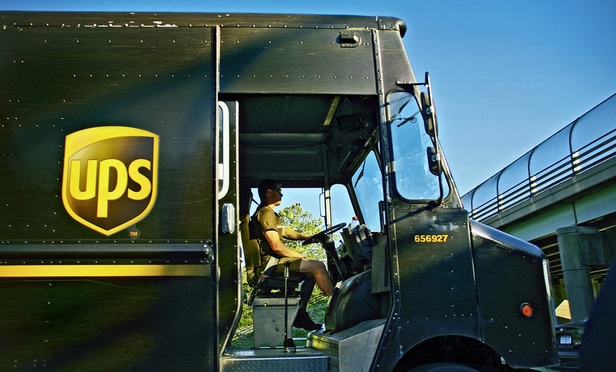In a decision that could force the United Parcel Service Inc. to pay hundreds of millions of dollars in damages and penalties, a Manhattan federal judge delivered a scathing indictment of a corporate culture where employees were “willfully blind” to the illegal shipment of cigarettes and where lawyers failed to implement a meaningful compliance program until they were staring down the barrel of a lawsuit.
U.S. District Judge Katherine Forrest of the Southern District of New York credited the Atlanta-based shipper for improving its compliance efforts in the last three years. However, she was far from impressed by what she saw as the lack of proactive effort by UPS to prevent illegal cigarette shipments until the company came under investigation for violating state and federal law and the terms of a 2005 agreement with New York state.
Instead, she wrote in the 221-page ruling, UPS enjoyed the boost in business it received as the U.S. Postal Service and other carriers complied with the 2010 Prevent All Cigarette Trafficking (PACT) Act.
“UPS argued at trial that it did ‘not put two and two together,’ and that it did not associate this increased business with any particular event,” Forrest wrote. “For a company with UPS’s sophistication and its evident commercial interests,” this makes no sense. “Frankly, the court does not buy it.”
Susan Rosenberg, a spokeswoman for UPS, said the company is still evaluating the decision. She said the company is pleased that Forrest found that its “current tobacco compliance program is adequate, and declined to award plaintiffs the injunctive relief they sought or to appoint a monitor to oversee UPS’s compliance program.”
The decision presents something of a lesson for corporate defendants on the consequences—both positive and negative—of remedying compliance issues once under threat of an enforcement action. Forrest, who held a bench trial in late September, decided the case against the backdrop of UPS’s compliance efforts, deeming the company culture to be one that “broadly accepted of non-compliance.”
She concluded UPS had violated an assurance of discontinuance (AOD) it signed with the state of New York in 2005 agreeing to cease transporting untaxed cigarettes. Forrest also found UPS liable for violations of the PACT Act and the Contraband Cigarette Trafficking Act.
UPS repeatedly violated the AOD by failing to audit shipments and knowingly transporting untaxed cigarettes from and between Native American reservations.
“Perfection was never required, but more should and could have been done,” Forrest wrote of the company’s failure to investigate whether customers were shipping cigarettes. “That UPS could have done more is demonstrated by the material improvements it has implemented in its procedures since this lawsuit was filed.”
UPS, represented by a team of lawyers from Morrison & Foerster, argued that it never knowingly transported cigarettes from and between Native American reservations, thereby defeating state tax collection measures.
Writing in State of New York v. United Parcel Service, 15-cv-1136, Forrest spent more than 10 pages dissecting the question of knowledge as it applies to corporations. While some of the facts that supported the finding that UPS had this knowledge were known only to individual or limited numbers of employees, that knowledge may be imputed to UPS as a corporate entity, she wrote. “Compartmentalization does not shield a company from knowledge maintained by employees,” she stated.
Attorney General Eric Schneiderman called the judge’s decision “a win for New York and a win for public health.”
Forrest will issue a final decision on damages and penalties and has given the parties until April 7 to submit evidence. According to Forrest’s decision, the city and state are seeking $800 million in penalties.
The judge rejected UPS’s argument that the government plaintiffs should be blocked from seeking damages because they waited too long to disclose the full sum they would be seeking. Forrest said the MoFo attorneys had turned down a preview of the damages calculation that was offered weeks before trial, presumably because they didn’t want to weaken their hand in arguing that the delay was fatal to the government’s damages request.
“The court is left with the distinct impression that UPS’s refusal to accept the calculation was a considered move designed to retain a ‘cleaner’ position on the very motion now under consideration,” she wrote.
Assistant Attorneys General Christopher Leung and John Oleske led the case for Schneiderman’s office.
Assistant Corporation Counsels Eric Proshansky, Leonard Matthew Braman, Lilia Isobel Toson, Hope Lu and Tonya Jenerette appeared for the city’s Law Department.
UPS was represented by Morrison & Foerster partners Carrie Cohen, Paul Friedman, Gregory Koltun, Jamie Levitt, Deanne Maynard and Mark McPherson.
The city and the state have a similar suit pending against FedEx Corp. in the Southern District of New York over the illegal shipment of cigarettes. Discovery is still being conducted in the case, but the plaintiffs have chalked up a few victories in the case thus far.
Last year, Southern District Judge Edgardo Ramos denied FedEx’s motion to dismiss the suit, City of New York v. FedEx, 14-cv-8985.
With an eye on its own legal battle, FedEx brought in a well-known trial lawyer last year to join a team from Stroock & Stroock & Lavan; in November, Beth Wilkinson of Wilkinson Walsh + Eskovitz entered her appearance in the case.
Copyright New York Law Journal. All rights reserved. This material may not be published, broadcast, rewritten, or redistributed.
Related Decisions:





